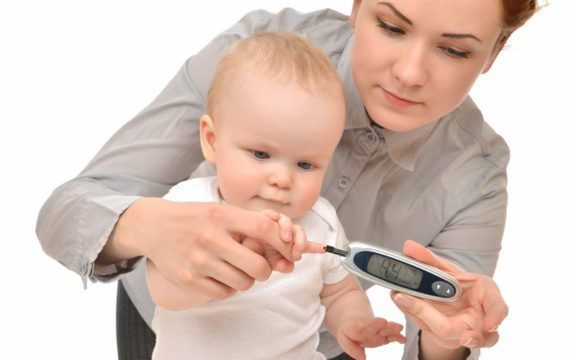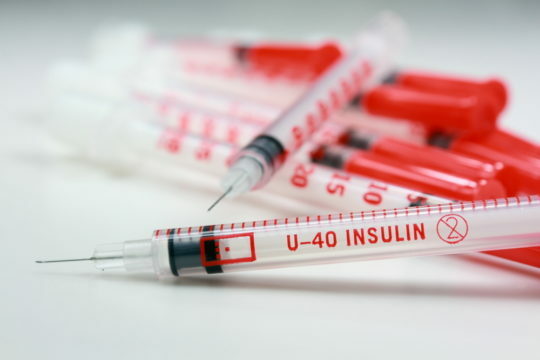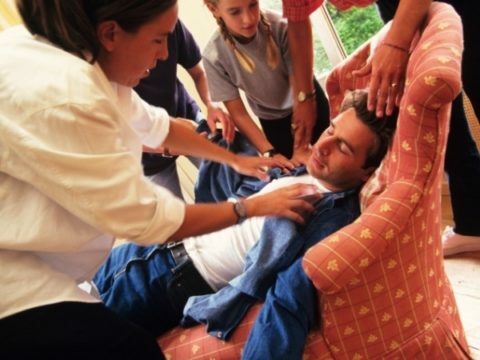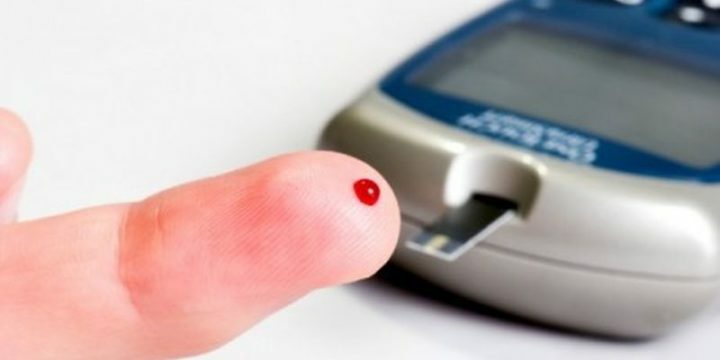Emergency care for hyperglycemic coma includes a number of actions that must be performed in a calm state, quickly and confidently. A coma can occur in every patient suffering from diabetes mellitus. The complexity of the disease lies in its insidiousness - sometimes a person does not even realize that it is sick, because diabetes does not immediately manifest symptoms.
Hyperglycemia occurs against a background of a sharp increase in blood glucose levels. It is necessary to know its symptoms and be able to distinguish the state from hypoglycemic coma, caused by a decrease in the level of sugar. Depending on the situation, the actions of the patient accompanying his person or doctor will be completely different. In the event of an error, it is easy to aggravate the patient's state of health by bringing it to a critical state.

Symptoms of
The state of the patient with hyperglycemia does not deteriorate sharply, usually the development of coma occurs within 3 hours, sometimes the process can take up to several days. The first signs of its onset are as follows:
- a sharp thirst, which is increasing even when drinking water;
- frequent urge to urinate and urinate;
- general fatigue;
- previous weight loss;
- blurred vision, blurred vision;
- loss of appetite;
- skin dryness and itching caused by it;
- feeling of dryness in the oral cavity;
- arrhythmia;
- unaccustomed breathing;
- loss of consciousness due to the confluence of the patient into a coma.
The patient with hyperglycemia behaves very strange, his skin pale, while on the mucous may appear dark spots. The body temperature is usually low, the pressure is low, the pulse is rapid, the smell of acetone from the mouth is possible - all these signs should alert the patient and his loved ones. When you turn to the doctor and analyze for blood sugar, you can prevent complications.
First-aid action algorithm
Sometimes the condition can worsen suddenly, without the appearance of warning symptoms. Accordingly, the patient and the people around him are not always ready to worsen their health. In hyperglycemic coma, emergency care consists in clearly planned actions:
- immediately call a doctor, asking about it to third parties nearby. If there is no way to do this, try to call an ambulance on your own, but the patient should not be left alone. This is the first thing a person should do when he witnesses coma onset in a person;
- before the arrival of a doctor, it is necessary to impose a patient with warm blankets, jackets or heaters to reduce heat loss. It is necessary to release the chest to facilitate breathing;
- provide a comfortable position of the patient, but do not lay it lying down, so as not to stoke the tongue, so that the patient may suffocate. It is better to put it on its side;
- to control body temperature, heart rate, if possible hemodynamics - this will help diagnose complications;
- if possible, conduct glucose testing, which will help to find out the level of sugar in the blood;
- introduce a short-acting insulin dose;
- if the patient is conscious, it is necessary to provide drinking water in small doses every 5 minutes.
If there is an opportunity to urgently take the patient to a medical institution, then this will be the best help for him.
Helping a child
Hyperglycemic coma in children is accompanied by a number of additional symptoms and complications, so the algorithm for emergency care for small patients is somewhat different.
The development of hyperglycemia is associated with insulin insufficiency - the causes of this phenomenon are unimportant, the main thing is to fill its deficiency. To do this, using a glucometer to measure the level of glucose in the blood and gradually small doses of insulin return the sugar back to normal.

The child should always drink water, you can give him a fat-free broth. It is better not to offer any heavy food until the glucose returns to normal. Its level should be monitored every 2 hours, and even after the normalization it is necessary to continue measurements.
The introduction of medications is possible only in a hospital, so without the help of a doctor can not do. Arriving ambulance doctors can deliver a dropper or administer medications that promote normal blood circulation. This is necessary to stabilize the body, which will avoid serious complications.
What should not be done
- First aid should be provided in a calm state, especially if the patient is a child - panic from relatives or relatives can cause deterioration.
- You can not leave the patient alone, even for a few minutes.
- If the patient claims that he needs to inject another dose of insulin, you can not prevent this, considering his actions inadequate. The patient feels a deviation from the usual state and, perhaps, knows that he missed another dose of insulin.
- It is also not advisable to refuse to call a doctor or visit a clinic, even if the patient claims that everything is in order. It is better to use the help of medical staff, rather than then regret.
Causes of
In most cases, with the onset of hyperglycemic coma, people who do not know about their diagnosis are confronted. Diabetics live with this disease, so they have drugs and a glucometer that allows you to determine the level of sugar. It is much easier for them to warn anyone than to people who do not have medicines and ancillary equipment.

Among the causes of coma are:
- the wrong dosage of insulin( its insufficiency);
- missed insulin dose;
- non-compliance with diabetic diets;
- injected insulin is overdue or improperly stored;
- the presence of pancreatic diseases, which prevent the normal development and assimilation of insulin.
Hyperglycemic coma can lead to death - this is due to deterioration in the general condition of the patient, decreasing blood pressure, circulatory disorders and cardiac function. Therefore, ignore the knowledge about the symptoms, first aid and prevention of this condition is not worth it.
Prevention
The etiology of the complication and its severity depends only on the patient himself. Diabetics should closely monitor the level of glucose in the blood, regularly and correctly take the necessary drugs that are prescribed by the doctor. It is necessary to avoid physical stress, stressful situations are unacceptable, since any nervous breakdown can lead to abrupt changes in the endocrine system.
Special attention should be given to sick children, as the disease reflects on their hormonal background, causes overexcitation, stress, reduces immunity, which leads to other diseases and frequent colds. It is necessary to observe a strict diet, and children and strive to eat delicious in secret from their parents.
Adult patients should understand that diabetes is a very insidious disease, several types of coma may occur. Do not overstrain and eat forbidden food, hoping that the dose of the drug normalizes the level of glucose.
Conclusion
Hyperglycemic coma requires urgent care in any of its manifestations. Immediate address to a doctor or calling an ambulance will save you from serious complications and, possibly, save your life. After all, patients often find themselves in such a state, when they can not do without resuscitation. And their holding is possible only in the hospital under the supervision of doctors.




